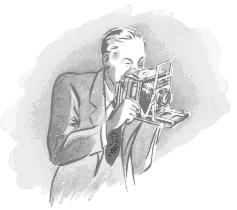| View previous topic :: View next topic |
| Author |
Message |
macman
Joined: 22 Sep 2005
Posts: 1
|
|
| Back to top |
|
 |
Les
Joined: 09 May 2001
Posts: 2682
Location: Detroit, MI
|
 Posted: Sat Sep 24, 2005 2:37 am Post subject: Posted: Sat Sep 24, 2005 2:37 am Post subject: |
 |
|
Not really much to know about them. They were a main stay in most commerical labs until after WWII when enlarging paper and smaller formats pretty much took over.
Made of oak to furniture standards you laid a neg down with paper on top then close the handle until the handle closed a switch and turned the lights on. Poor labs had you count "one-one-thousand" nicer labs had a timer on the lights.
Back in the dark ages (before digital brought the darkroom into the light) lab techs and photographers would sometimes make emmensely complicated layers of amberlith and ruby lith in odd shapes to automatically dodge the right areas and get a perfect print from one exposure. This was common when printing 50 to 250 prints.
Dark room equipment from the post daguerrian era has not caught on as a collectible and therefore values are usually lower than the shipping costs. I've seen several people refinish these printers to "better than new" spending many hours thinking they can make a killing. All were proved wrong.
After WWII the hot contact printer was made by Morse, Inc. The 10x10 version used 40 argon bulbs (I have seen a 36inch version) each with its own switch and switches to turn on or off lights in concentric rings and rows were also on the front. The purple/blue light gave very fast exposures on AZO papers.
3 to 5 years ago these were still selling in the $300-$400 range on ebay. Now it's a tenth of that.
As to age here's a rough guide
Folmer & Schwing Division of Ekc 1907-1917
Folmer & Schwing Deptartment of Ekc 1917-1926
Folmer Graflex Corp 1926-1945
Graflex Inc. 1945-1956
Now the 1917 date for Division vs Dept. is soft. Officially they changed their name and moved a couple of bean counters from their outpost to the Kodak mother house but they continued to used the old 'Division" nameplates until stock was exhausted. On fast moving cameras like the Speed Graphic the change was fast. On slower moving equipment or when the old stock of plates was large, the change could take years. I've even seen situations where they seem to find a batch of old plates after using new ones.
The 1926 change was radical as they fully separated from Kodak, but had no sales force and not marketing department, so while the employees no longer ate at the Kodak commisary, they were still dependant on Kodak for a lot of things, and Kodak was dependent on them for making most of their pro camera equipment.
[ This Message was edited by: Les on 2005-09-23 19:45 ] |
|
| Back to top |
|
 |
|
|
You cannot post new topics in this forum
You cannot reply to topics in this forum
You cannot edit your posts in this forum
You cannot delete your posts in this forum
You cannot vote in polls in this forum
|
Powered by phpBB © 2001, 2005 phpBB Group
|


